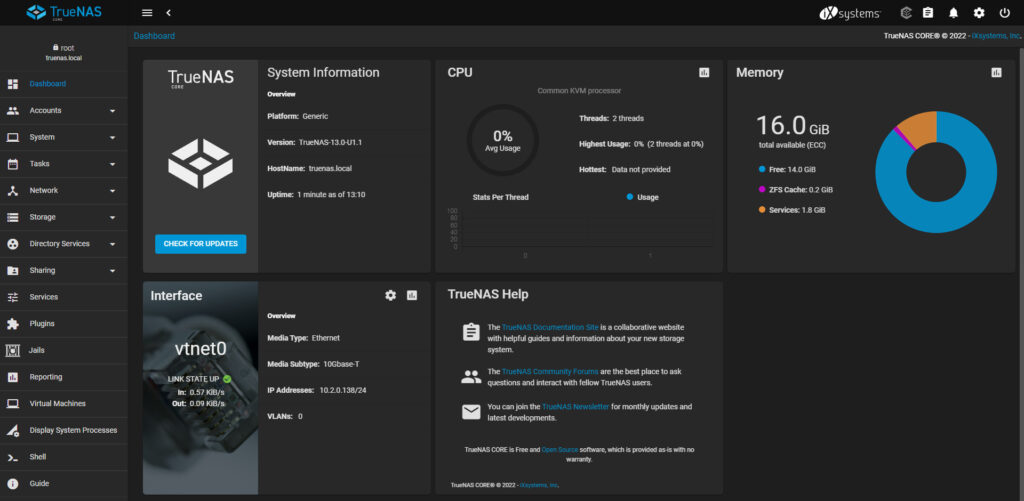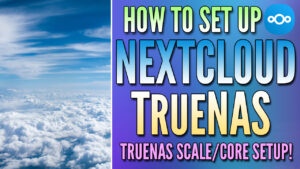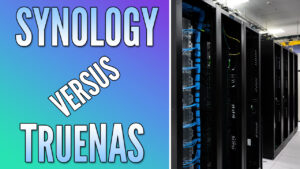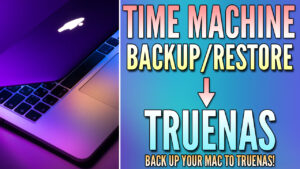In this article, we’re going to look at TrueNAS Core vs TrueNAS Scale and compare both solutions to help you pick which option is best for you. At one point in time, this was a very difficult decision as TrueNAS Core and TrueNAS Scale were both actively developed, but that decision is a lot easier today. Simply put, you should use TrueNAS Scale (Community Edition), and we’ll look at the reasons why you should below.
TrueNAS Core vs TrueNAS Scale: Which NAS OS to Pick?
TrueNAS Core and TrueNAS Scale are both extremely similar, and also very different…especially today. Before we look at some of their differences, let’s look at both operating systems.
What are TrueNAS Core and TrueNAS Scale?
TrueNAS Core (formerly known as FreeNAS) is a NAS operating system designed on an OpenZFS file system and is based on FreeBSD. TrueNAS Scale (which now, as of April 2025, is known as TrueNAS Community Edition) is designed on OpenZFS as well, but it’s based on Debian Linux. This seemingly minor difference ends up being tremendous due to the differences of the underlying OS.

TrueNAS Core was the only offering from iXsystems (the developer of TrueNAS) until 2021, when TrueNAS Scale was released. TrueNAS Scale has slowly progressed over the past few years and is now the premier offering by iXsystems, and the recent releases (24.10 in specific) were HUGE updates offering many quality of life changes like ZFS expansion, and reintroducing Docker support (after moving away from Kubernetes).

TrueNAS Core vs Scale: Which Should You Use in 2025?
At one point, picking between TrueNAS Core vs Scale came down to feature differences and user experience. However, since late 2024, the decision isn’t up for much debate anymore. TrueNAS Core is in a security patch phase, meaning no new features are being released and it is simply being maintained. That makes TrueNAS Scale the main offering and the option every new user should use.
By using TrueNAS Scale, you’ll get some of the latest enhancements like ZFS expansion, updated deduplication, Docker support, and more.

Migrating From TrueNAS Core to TrueNAS Scale (Community)
Since TrueNAS Scale (Community Edition) is the right option for most, at some point in the near future, it will make sense to migrate to it. This is something that must be done carefully, so here are a few important notes that you should follow with this:
- Take backups of absolutely everything. While you realistically should be backing up your boot device (as the datasets won’t be touched during the migration), I like to take backups of everything to be safe.
- The migration process is technically an install, so export all of your settings, follow the migration steps, then re-import your settings, and everything should function like it was.
As soon as you upgrade, it will appear like you can import your pool, and while you can do that, follow the steps in the TrueNAS article above to ensure that you import your settings so that everything will be configured like it was.
Conclusion & Final Thoughts on our TrueNAS Comparison
This article looked at TrueNAS Core vs Scale to help explain why, in 2025, it’s best to use TrueNAS Scale (Community Edition). If you’ve been using TrueNAS Core, you’re going to have to migrate at some point, and in my opinion, sooner is better than later.
You’re already missing out on all of the new features, so outside of staying on core for stability purposes (with the intentions of moving at a later time), you’ll have to migrate at some point. Since TrueNAS Scale (Community Edition) is now in its second or third phase of feature updates that TrueNAS Core didn’t receive, there’s a pretty significant usage difference between them.




